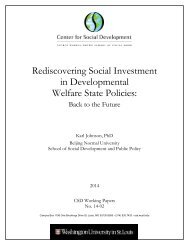Exploring and Assessing Intercultural Competence - Center for ...
Exploring and Assessing Intercultural Competence - Center for ...
Exploring and Assessing Intercultural Competence - Center for ...
Create successful ePaper yourself
Turn your PDF publications into a flip-book with our unique Google optimized e-Paper software.
<strong>Exploring</strong> <strong>and</strong> <strong>Assessing</strong> <strong>Intercultural</strong> <strong>Competence</strong><br />
Executive Summary<br />
The Project <strong>and</strong> the Participants<br />
FEIL’s first international research ef<strong>for</strong>t was a one <strong>and</strong> a half year project designed to explore <strong>and</strong><br />
assess the impact of intercultural experiences provided through service projects conducted as part<br />
of the Volunteers in International Partnerships program. This research project involved two<br />
sending <strong>and</strong> one receiving Member Organizations: Great Britain, Switzerl<strong>and</strong>, <strong>and</strong> Ecuador, <strong>and</strong><br />
was made possible through a funding grant obtained from the <strong>Center</strong> <strong>for</strong> Social Development of<br />
the Global Service Institute at Washington University in St. Louis, Missouri.<br />
Designed <strong>and</strong> directed by FEIL’s educational consultant, Dr. Alvino E. Fantini, the project began<br />
in July 2005 <strong>and</strong> was completed in December 2006, undergoing several stages: In the initial<br />
stage, an extensive survey was conducted of the intercultural literature as the basis <strong>for</strong> developing<br />
a comprehensive construct of “intercultural competence” <strong>and</strong> develop a tool <strong>for</strong> its assessment.<br />
After translating this instrument into German <strong>and</strong> Spanish, <strong>and</strong> adapting it to British English, the<br />
tool was then used with several groups – alumni, volunteers, <strong>and</strong> host mentors. The study was<br />
conducted through use of a survey questionnaire followed by personal interviews, with the<br />
assistance of research assistants employed in each of the three cooperating countries. The result<br />
was the production of an amazing amount of data, which were then analyzed to learn more about<br />
the impact of intercultural experiences on the lives <strong>and</strong> work of both sojourners <strong>and</strong> hosts.<br />
Assertions <strong>and</strong> Findings<br />
Although most people engaged in intercultural exchanges can anticipate the results, this<br />
systematic study yielded rich quantitative data (figures, graphs, <strong>and</strong> statistics) <strong>and</strong> qualitative data<br />
(anecdotes, comments, <strong>and</strong> quotes) that were important <strong>and</strong> insightful. The analysis of the data<br />
was based on ten assertions, all of which were strongly supported by the evidence:<br />
- that intercultural competence involves a complex of abilities<br />
- that learning the host language affects intercultural development in positive ways<br />
- that intercultural experiences are life-altering<br />
- that participant choices made during their sojourn produce certain intercultural<br />
consequences<br />
- that all parties in intercultural contact are affected<br />
- that service programs offer unique opportunities <strong>for</strong> sojourners <strong>and</strong> hosts, beyond<br />
traditional exchanges<br />
- that people are changed in positive ways as a result of this experience<br />
- that returnees lean toward specific life choices, life partners, life styles, values <strong>and</strong> jobs,<br />
as a result of their experience<br />
- that returnees often engage in activities that further impact on others in positive ways,<br />
<strong>and</strong><br />
- that their activities further the organizational mission.<br />
Although most everyone engaged in intercultural activities believes these assertions intuitively<br />
<strong>and</strong> perhaps experientially, the statistics <strong>and</strong> comments obtained provide substantial evidence that<br />
strongly supports all of these assertions. For example, specific attributes were cited as extremely<br />
important to the success of an intercultural experience. Participants gained dramatic insights<br />
about the significance of being able to communicate in the host tongue, both to remove barriers as<br />
well as to enable participation. As one alumna wrote, “Language was the key to everything, to<br />
<strong>Center</strong> <strong>for</strong> Social Development<br />
Washington University in St. Louis<br />
5
















